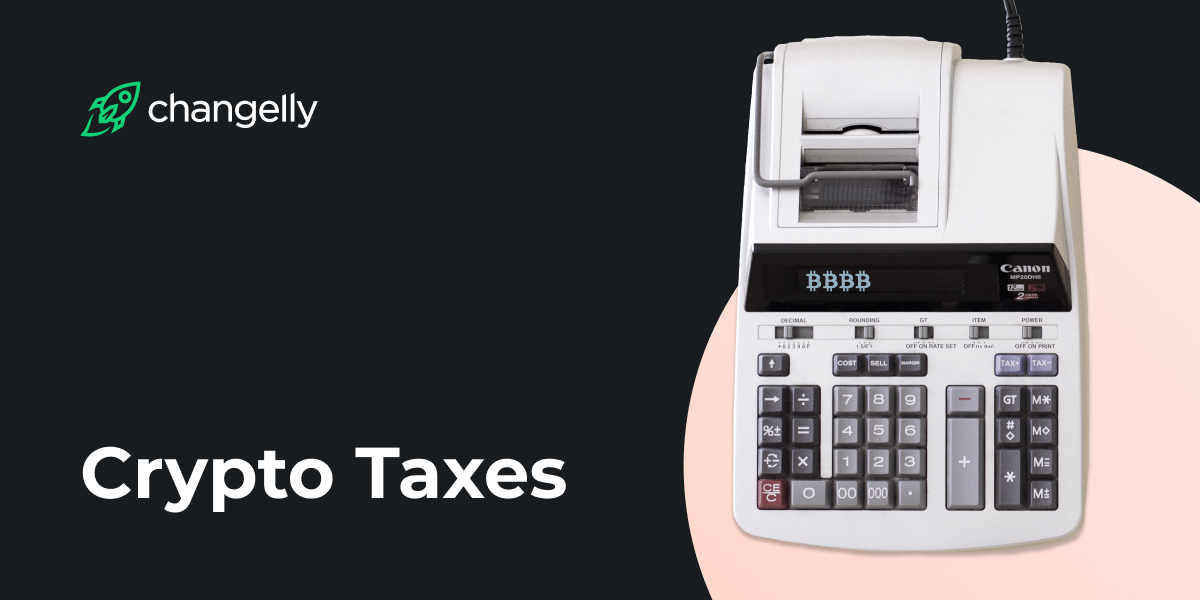What is the most appealing thing about cryptocurrencies? Besides being a decentralized entity, a cryptocurrency along with blockchain technology provide transparency, trust, and a range of advantages we lack in our regular lives.
Since cryptocurrencies are experiencing the next wave of hype, it might be said that we are going to embrace newcomers and, as a result, bring the day of mass adoption closer. However, what is the worst nightmare of the decentralized state? Obviously, it is regulation. With all the attention cryptocurrencies have at the moment, many countries have turned towards the world of decentralized digital assets. Even more countries introduce laws and statements that aim to regulate cryptocurrencies in any manner. One of the leverages that try to put some obligation on BTC is Bitcoin taxes.
We are going to explain how BTC is taxed and what countries have already introduced cryptocurrency taxation.
Table of Contents
- The IRS and Virtual Currency
- When Do You Have to Pay Taxes on Bitcoin?
- An Example of Capital Gains Tax
- The Net Investment Income Tax
- How to Pay Taxes on Bitcoin
- Legal and Tax Definition of Cryptocurrency
- Tax Software for Cryptocurrency
- TokenTax
- CryptoTrader.tax
- Tax Rules for Crypto In Different Countries
- #1. Internal Revenue Service, USA
- #2. United Kingdom, Canada, Australia
- #3. China & Hong Kong
- #4. India
- #5. Switzerland
- #6. Russia
- #7. Germany
- #8. New Zealand
- #9. The Philippines
- What Happens If You Don’t Pay Taxes?
- Cryptocurrency Tax Free Countries
- Crypto Tax Calculator
- Bottom Line
The IRS and Virtual Currency
The International Revenue Service (IRS) is the service that administers and collects taxes in the U.S. Once cryptocurrency became a “thing,” it drew the attention of the IRS and other government agencies. If a person or a group of people take profit from virtual currency, they must pay taxes. The IRS considers Bitcoin a property, therefore, it is a subject of capital gain tax.
The IRS also determines BTC and other digital assets as “virtual currencies.” According to the official IRS website, cryptocurrency is a type of virtual currency that utilizes cryptography to validate and secure transactions that are digitally recorded on a distributed ledger, such as a blockchain.
Virtual currency that has an equivalent value in real currency, or that acts as a substitute for real currency, is referred to as “convertible” virtual currency. Bitcoin is one example of a convertible virtual currency. Bitcoin can be digitally traded between users and can be purchased for, or exchanged into, U.S. dollars, Euros, and other real or virtual currencies.
When Do You Have to Pay Taxes on Bitcoin?
Since BTC and other crypto are determined as property, a cryptocurrency owner can sell, buy or trade it. Whether a crypto holder takes profit (capital gain) or loss (capital loss) from cryptocurrency, he/she has to pay taxes on Bitcoin. It is important to note that all transactions using virtual currency must be reported in U.S. dollars.
A tax year starts January 1 and ends December 31. According to U.S. policy, an individual must file annual income taxes by April 15.
An Example of Capital Gains Tax
Imagine you bought BTC at $10,000 (lucky you) in 2020. At the end of the year, Bitcoin managed to grow up to $20,000, and you decide to sell it. It means that technically, you’ve earned $10,000. This amount is your capital gain. Since you’ve been holding BTC for a year (or less), it is a short-term gain. In this case, BTC taxes will be counted the same way as your ordinary income taxes.
If you hold BTC for over a year, this is a long-term gain that is taxed at a rate of 0%, 15%, or 20%.
The Net Investment Income Tax
We need to pay attention to the fact that you might need to pay a 3.8% net investment income tax. At its core, net investment income tax is based on your filing status and income. If your overall modified adjusted gross income (so-called MAGI) is more than $200,000 (for a single taxpayer), then you have to pay 3.8% investment income tax.
Married couples who file their taxes jointly have to pay the investment income tax if their MAGI is $250,000 and above. The threshold drops to $125,000 if married couples file their taxes separately. Please note that net investment income tax can be applied to investment income only.
How to Pay Taxes on Bitcoin
Since the industry is developing rapidly, new services are required. There are platforms that allow you to calculate your crypto taxes effortlessly. Moreover, most of the regulated cryptocurrency exchanges have a built-in feature that will help you with taxes regarding crypto.
Legal and Tax Definition of Cryptocurrency
The legal status of cryptocurrency varies from country to country. While some of them ban mining and operations with cryptocurrency, equaling them to crime, others do not impose taxes and do not consider crypto to be personal financial assets at all.
As a rule, crypto assets are generally treated as either property or an investment asset. Bitcoin and altcoins are subject to the relevant legislation for tax purposes.
In a number of countries, like India, governments have not yet made a formal decision on the regulation of cryptocurrencies. While they are still thinking about which side to take, they warn potential users about the high risks of investing in crypto due to its high volatility.
Tax Software for Cryptocurrency
TokenTax
TokenTax is probably the simplest way to report your cryptographic money operations and income taxes. Rated by Forbes as the best platform for documenting digital money taxes, TokenTax is the only crypto tax platform that supports all the major exchange websites.
This software has a direct connection with every one of the exchange platforms to deliver automatic reposts. If an exchange does not allow data import, you can transfer a record with your exchange information to TokenTax. When your data is transferred, TokenTax will generate the forms: all you need is to fill them out and file.

CryptoTrader.tax
CryptoTrader.tax enables digital currency traders to ascertain their gains and loss quickly. Their basic interface makes it simple to import your exchange data and ensure that you’re not overpaying on your taxes.
Their software now supports Coinbase, Bittrex, Gemini, Binance, and Poloniex, HitBTC, etc. CryptoTrader will compute your tax duties implementing a similar first-in-first-out technique that’s utilized by CPAs and tax experts.
Also, CryptoTrader makes a so-called audit trail that records all calculations used in the tax filing. This report incorporates a salary report, short and long sales chart, closing positions report, and so on.
Tax Rules for Crypto In Different Countries
#1. Internal Revenue Service, USA
Since the U.S. is the major market for cryptocurrencies, the government pays close attention to crypto regulation and taxation. It is no secret that the U.S. has a complicated taxation system. This concerns cryptocurrencies as well.
Bitcoin is considered “virtual currency” in the official World Bank and FBI reports. Bitcoin is classified as “decentralized virtual currency” by the U.S. Treasury Department’s Financial Crimes Commission.
In March 2013, FinCEN announced that the exchange of any cryptocurrencies for fiat money should be regulated in the same way as the fiat to fiat exchange (e.g., dollars for euros). In November 2013, the U.S. Senate held a hearing on Bitcoin, during which it was decided not to ban the circulation of cryptocurrencies but to work to regulate the business.
In August 2013, a Texas Eastern District judge decided that since Bitcoins can be used as money to pay for goods or exchanged for common currencies such as the U.S. dollar, euro, yen, or yuan, Bitcoin is a currency or a form of money.
On March 25, 2014, the U.S. Internal Revenue Service released a guide to the taxation of Bitcoins and other virtual currencies. For federal tax purposes, Bitcoins are considered property, i.e., those who purchase Bitcoins as an investment instrument, selling Bitcoins will generate “capital gains” rather than “foreign exchange gains.” Bitcoins are taxed. High volatility of the Bitcoin exchange rate can lead to tax liabilities for those who use Bitcoin to pay for goods and services (in particular, the obligation to pay tax on capital gains).
In the fall of 2017, the U.S. Securities and Exchange Commission (SEC) opened its first case involving fraud with an ICO.
The Internal Revenue Service has recently published tax guidance that states that cryptocurrency should be taxed according to the same rules as any other property or capital gains. Cryptocurrency is also money, even though in a digital format only. According to the IRS, if you gain some cryptocurrency via airdrop or hard fork, you must pay tax on it (even if you did not ask for that asset transfer).
Both investors and traders must report about crypto trades, whether they are profitable or not. Most of the regulated crypto exchanges (Coinbase, Kraken, etc.) cooperate with tax authorities and might disclose information about their customers if users complete over 200 transactions and have an annual trading volume of over $20,000.
However, if a crypto enthusiast purchases crypto for fiat and after that stores it in a digital wallet without further movement (i.e. HODL), then he/she does not have to pay taxes.
In other cases, a crypto investor or trader must report about transactions. The declaration must specify the dollar equivalent of each transaction. If a user gets income from mining, he/she will pay an income tax of 10-37% (depending on the level of earnings).
If a crypto user sells digital assets for fiat or converts them into other cryptocurrencies, he/she should pay capital yield tax (up to 20%).
It is important to note that if you are an American citizen but currently live in another country, you still need to pay taxes.
#2. United Kingdom, Canada, Australia

HMRC (Her Majesty’s Revenue and Customs) do not have taxation on buying cryptocurrency. Therefore, you can purchase BTC and other digital assets and even hold them for as long as you want. However, if you are willing to sell it, then you have to pay Capital Gain Tax (CGT). The rate of capital gains tax in the U.K. also varies depending on the taxable amount and ranges from 10% to 28%.
There is no defined rule on crypto staking or lending. Yet, crypto trading is subject to CGT since it is basically the selling of one asset for another.
In Canada, cryptocurrency profit is also taxed, but citizens need to pay taxes only for 50% of their gains. There are no taxes on buying or storing cryptocurrencies. According to the official website of the Canada Revenue Agency (CRA), cryptocurrencies are treated as a commodity for purposes of the Income Tax Act.
Any income from transactions involving cryptocurrency is generally treated as business income or as a capital gain, depending on the circumstances, – claims CRA.
For example, you acquired crypto worth $100,000. By trading your crypto through the year, you managed to earn $70,000, and now you have $170,000. In this case, you need to report a business income of $70,000 on your income tax return.
In Australia, operations involving Bitcoins and other cryptocurrencies are equal to barter agreements. For tax purposes, Bitcoin is also recognized as property rather than a means of payment or foreign currency.
Companies conducting transactions in Bitcoin are required to document, record, and date transactions accordingly. Companies that receive Bitcoin as payment should report its value in Australian dollars, and it will be treated as ordinary income.
On the other hand, transactions with Bitcoin for personal use are exempt from taxation in the following cases:
- When Bitcoin is used as payment for goods and services for personal use;
- When the transaction value does not exceed $10,000 AUD.
Bitcoin mining and exchanges for commercial purposes in Australia are considered to be exchange trading and are subject to appropriate taxes.
#3. China & Hong Kong
On December 5, 2013, the People’s Bank of China banned Chinese financial companies from conducting operations with Bitcoins. At the same time, individuals can freely participate in Internet transactions at their own risk. Cryptocurrencies are treated as virtual property and are subject to income tax for capital gains (in case the trade is an investment).
In Hong Kong, crypto exchanges are not banned – Chinese crypto traders often use Hong Kong platforms to cash out their digital assets. Hong Kong its first regulated cryptocurrency platform at the end of 2020. Yet, the crypto regulations are not as strict as, for example, in the U.S. Hong Kong treats Bitcoin and altcoins as virtual commodities (virtual currencies). Unlike other countries, Hong Kong does not make you pay taxes if you sell crypto and get income. But if you are a professional trader, you must pay income tax on your profits.
According to a press release dated April 3, 2019, the Inland Revenue Department does not keep records of individuals who need to pay taxes regarding the use of virtual assets, they only examine special cases.
If you want to buy BTC or a range of other crypto assets available on our platform (170+) with ease, you can use the following widget to efficiently exchange or purchase crypto with a credit card (Visa, Mastercard), bank transfer, or Apple Pay.
#4. India
India has a complicated relationship with cryptocurrencies. It regularly tries to ban crypto. As of February 2021, the Indian government is going to consider the bill banning cryptocurrencies. Such news might affect the cryptocurrency market and bring some FUD to the community. However, BTC is a strong entity that can handle the situation.
In April 2018, the Reserve Bank of India practically destroyed the country’s cryptocurrency industry by forcing all banks in the country to cease doing business with the cryptocurrency exchanges. However, later they changed the laws and made the following proposals:
- The purchase or sale of cryptocurrency will be considered a service.
- The value of the cryptocurrency can be determined on the basis of the transaction value in rupees or the equivalent in any freely convertible foreign currency.
- If buyers and sellers are in India, the transaction will be considered as software delivery.
- Transactions outside Indian territory will be subject to integrated GST (good and services tax) and will be treated as imports or exports of goods.
According to the report published by the Times of India at the end of 2020, the total amount of traded BTC in India was around $5,5 billion. The government was considering a proposal that would impose 18% goods and services tax (GST) on BTC transactions.
The Indian mood regarding cryptocurrencies is constantly changing. The government sees the potential behind blockchain technology but currently does not know how to start crypto regulation. The creation of the regulation system might take a while, so crypto traders should seize the opportunity for crypto trades.
#5. Switzerland
Switzerland is one of those countries that treats BTC and other cryptocurrencies well. Considering crypto assets as equivalent to holding cash or precious metals, Switzerland requires crypto holders to pay taxes accordingly. Since cryptocurrency has a market value, it has to be declared on a Swiss tax return.

Different Swiss cantons might have different declaration requirements. In Basel-Stadt, a crypto owner must declare crypto assets as “Cash, precious metals, and other assets.” Securities in crypto have to be declared as “Securities and Assets. People who have crypto on their accounts need to state crypto assets at their value as of December 31 of the fiscal year.
Some good news is that the Swiss canton of Zug (which is super crypto-friendly) will accept taxes on cryptocurrencies. The crypto mass adoption is going further.
#6. Russia
The Russian government has recently issued a statement upon BTC and cryptocurrency taxation. From January 2021, BTC and other digital currencies are considered private property. Therefore, a crypto owner must pay taxes if the annual crypto trading amount exceeds 600,000 roubles ($7,900).
Since cryptocurrency equals a property, an owner of digital currency can do whatever he/she wants as long as the activity is legal (i.e., trading, exchange, lending, HODLing). However, it is forbidden to pay for services or goods in cryptocurrency.
There is no clear statement regarding mining taxation. The government may charge 13% up to 20% of mining reward. The Ministry of Finance is planning to add some amendments that will specify miners’ positions. According to the current statement, cryptocurrency cannot be used as a method of payment for goods and services. Mining reward, in its turn, is a reward for a service provided. It seems that the Russian government needs to reconsider the regulation in this field.
#7. Germany
Germany has an interesting tax policy in relation to crypto. The government doesn’t consider Bitcoins or altcoins to be currency, shares, or goods. However, digital assets are treated as private property. Thus, according to law, private sales that do not exceed 600 euros are tax exempted. If you sell crypto within one year after acquiring it, you will need to pay tax for short-term gain. For longer-term gains, no taxes apply. However, you still have to report on all buy/sell operations with crypto.
#8. New Zealand
At the beginning of December 2020, New Zealand introduced new tax guidance regarding crypto assets. The New Zealand government recognizes cryptocurrency as a form of property. Since New Zealand doesn’t have a broad capital gains regime, crypto holders are obliged to pay taxes on cryptocurrency if:
- A person purchases crypto assets in order to resale them later;
- Uses cryptocurrency in order to make a profit;
- Trades or deals in crypto assets with sufficient effort and time-investment.
There is no specific rule on how the government taxes mining activity.
#9. The Philippines
In the Philippines, there is an authority (CEZA) that regulates cryptocurrency on the territory of the country. It has released a new set of rules controlling Digital Asset Token Offering (DATO). This covers the purchasing of cryptocurrencies, which includes utility and security tokens. Thus, the government aims to protect the interest of cryptocurrency investors and at the same time promote the concept and usage of cryptocurrencies.
What Happens If You Don’t Pay Taxes?

If you know how your government treats cryptocurrencies, then it will be easier for you to answer this question. Does your country treat crypto assets as commodities/property/or as smth else? Perhaps, there are no BTC taxes at all (read about cryptocurrency tax-free countries below).
It is not quite clear how the authorities will track cryptocurrency gains that are made, for example, via unregulated, decentralized platforms. If regulated trading platforms like Coinbase have to report IRS about users’ transactions, then peer-to-peer (P2P) exchanges are not obliged to do so. Since all the transactions are transparently reflected in the blockchain, authorities may monitor your transaction history. However, the government can’t track all your BTC and crypto transactions unless they know your transaction I.D. or transaction hash, and so on. The question remains open.
Cryptocurrency Tax Free Countries
Even in 2021, there are still countries that do not oblige you to pay cryptocurrency and BTC taxes. These are:
- Belarus
As of now, the country doesn’t have any strict policy regarding cryptocurrency. However, cryptocurrency is gaining momentum, and the crypto treatment may soon be changed.
- Malaysia
Cryptocurrency investments, trading, and hodling are not subject to taxation in Malaysia. Yet, the authorities intend to change the situation around crypto assets and Bitcoin taxation and want to introduce updated guidelines this year.
- Portugal
Portugal can be considered a crypto paradise. The country does not make you pay taxes on Bitcoin and other crypto assets even if you are a trader (stock traders have to pay a 28% tax rate).
- Slovenia
There are no specific cryptocurrency tax laws in Slovenia. One can sell BTC and other crypto without a necessity to pay capital gain tax. Yet, businesses that receive payments in BTC and other decentralized digital assets must pay tax at the corporate rate (this also applies to the mining activity). Also, a company cannot use cryptocurrency as the only method of payment.
Crypto Tax Calculator
In order to facilitate crypto owners’ lives, some of the regulated cryptocurrency platforms like Coinbase provide users with crypto tax calculators. As of now, if you are a U.S. citizen or a resident of the country that requires BTC and other crypto taxations, you can put all the credentials into a crypto tax calculator and get the final amount needed to be paid.
You can easily figure out the cryptocurrency taxes using such online calculators as Crypto Tax Calculator, CoinTracker, Koinly, and many other similar services.
Bottom Line
Unfortunately, the vast majority of countries are aiming to control cryptocurrencies: they realize that crypto-assets pose a threat to traditional fiat currencies and the global financial system. However, the process of legalization will take many more years, so, for now, we can enjoy relative financial freedom from taxes. In most cases, regular Bitcoin users performing transactions with minor sums are not obliged to pay any taxes at all.
Disclaimer: This article should not be considered as offering trading or investment recommendations. The cryptocurrency market suffers from high volatility and occasional arbitrary movements. While price analysis is a useful tool, it should not be considered predictive for the future performance of any investment instrument.












Thanks for any other informative blog. The place else could I am getting that type of information written in such a perfect means? I’ve a mission that I’m simply now working on, and I’ve been on the glance out for such info.